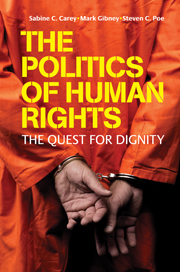Book contents
- Frontmatter
- Contents
- List of text boxes
- List of figures
- List of tables
- List of abbreviations
- Introduction
- Part I Human rights and state responsibilities
- 1 The concept of human rights
- 2 State responsibilities
- 3 Rights with responsibilities
- Part II Empirical representations and explanations of human rights violations
- Part III Intervening and rebuilding in the wake of repression
- Bibliography
- Index
- References
2 - State responsibilities
Published online by Cambridge University Press: 05 June 2012
- Frontmatter
- Contents
- List of text boxes
- List of figures
- List of tables
- List of abbreviations
- Introduction
- Part I Human rights and state responsibilities
- 1 The concept of human rights
- 2 State responsibilities
- 3 Rights with responsibilities
- Part II Empirical representations and explanations of human rights violations
- Part III Intervening and rebuilding in the wake of repression
- Bibliography
- Index
- References
Summary
Our focus in the previous chapter was on the meaning of human rights. In the present chapter we examine the question of state responsibility. What obligations do states have to protect human rights, and when are states responsible for violating human rights? According to Article 1 of the International Law Commission's (Draft) Articles on State Responsibility, which were presented to the UN General Assembly in 2001, ‘Every internationally wrongful act of a State entails the international responsibility of that state’ (Crawford 2002). But when does a state commit an ‘internationally wrongful act’? And what does it mean to be ‘responsible’ for this?
In most cases, establishing state responsibility for human rights violations will not be difficult, although states will do everything in their power to hide their actions from worldwide scrutiny. Imagine a situation where security officers of state A torture political dissidents in that country. This behaviour becomes public and the actions of the individuals involved are tracked back to the political leaders. State A is responsible for committing an internationally wrongful act and is thereby acting in violation of international law.
However, there will be other instances where establishing and assigning responsibility will be much more difficult. This is especially the case when a state acts outside its own territorial borders, or when a state's domestic policies have severe negative human rights consequences for those living in other countries.
- Type
- Chapter
- Information
- The Politics of Human RightsThe Quest for Dignity, pp. 40 - 69Publisher: Cambridge University PressPrint publication year: 2010



